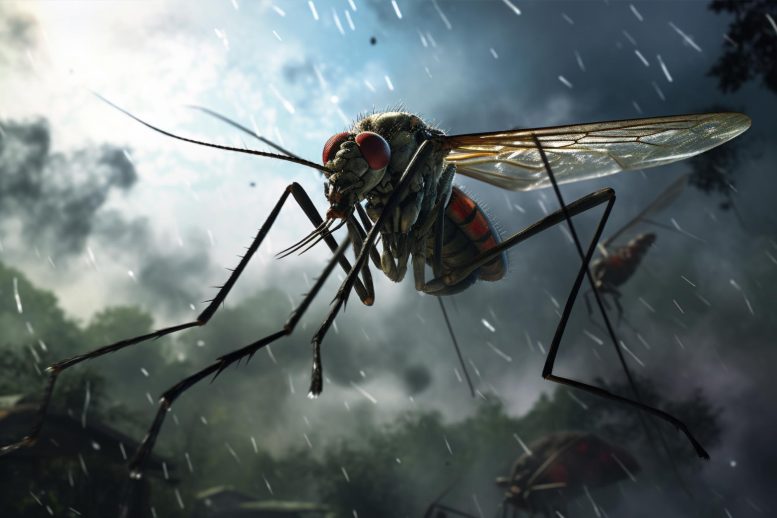
Research indicates that certain individuals truly are more attractive to mosquitoes due to specific skin odors. These odors, produced by fatty acids present in sebum (the oily substance that moisturizes skin), influence mosquito behavior.
Some people are more attractive to mosquitos than others, and new research is starting to show why. This Reactions episode dives into the chemistry of the molecules on our skin that make some of us so much more appealing to these pesky insects. It also reveals which products we can use to try to deter them.
Video Transcript:
Are you a mosquito magnet?
Because I am a mosquito magnet. Mosquitoes love me. A mosquito would bite me no matter my pronouns.
I swear there can be eight people at a barbecue and every single mosquito makes a beeline directly to me, like I am their personal barbecue. That is why I have indoor barbecues, not recommended by the American Chemical Society.
And guess what? If you’re a mosquito magnet, we are not imagining it. There is really something that makes us more attractive to mosquitoes, at least.
I always said pro-bos-kis when I worked in a Drosophila lab and it does seem that that’s a valid pronunciation, but a pro-bos-sis is more accepted.
Before we get into why mosquitoes love specific people more than others, let’s walk through what happens when these mini-vampires suck your blood.
When a female mosquito lands on you, because it is only the females that bite, it inserts its proboscis into you. This proboscis is a tiny mouthful of six needles that saw their way into your skin.
Two of the needles are serrated like a saw blade, but the proboscis is shaped in a way to minimize pain so that you don’t immediately swat the mosquito off.
There is a soft part that hits you first, and then the sawing action is combined with a light vibration so that less force is required.
Some scientists are actually trying to design similarly shaped microneedles for more painless injections, which sounds good.i So I guess mosquitoes are finally doing something good for society.
Anyway, mosquitoes don’t just suck your blood. They actually inject some of their saliva into you as well.
And while scientists are still trying to tease apart exactly which chemicals in the spit do what, some of them seem to act as numbing agents to keep you from noticing you’ve been bitten.
Others seem to act as vasodilators and anticoagulants, keeping your blood vessels open and your blood from clotting.
Now, there are over 100 proteins in mosquito saliva and not all of their functions are even known yet.
But we do know that that cocktail of chemicals is also why we get itchy. So your body actually has an allergic reaction to mosquito bites, specifically to some of those 100 chemicals in the mosquito’s spit.
Your immune system recognizes the foreign mosquito proteins and starts up a histamine response. This brings white blood cells to the area and it also activates other immune tools that cause itchiness.
And I hate it all so much. They always find me and I always get itchy and sometimes those bites last for weeks.
So how do they find me in the first place?
Mosquitoes use a bunch of different sensory clues to find us. They can hone in on our body heat. They can follow the scent of CO2 from our breath. And I guess also just see us sometimes ’cause we’re really big and the mosquitoes are really small so they can see us.
But those big, broad sensory clues give mosquitoes an idea about where humans
are in general. Once they find our barbecue, how do they choose who to chomp down on?
Well, there’s another big way that mosquitoes find us. It’s skin odor.
There have been lots of studies over the years to figure out what makes some people smell so much more delicious to some mosquitoes than others.
Some studies have said that blood type is involved. Others indicate that what food or drink you’ve consumed might play a role. Some say that pregnancy might impact mosquito attractiveness.
And then there are other studies that say that the presence or absence of a malaria infection might impact whether or not mosquitoes wanna bite you.
So these studies suggest that people infected with malaria might smell more attractive to mosquitoes than others, which is fascinating because that would make it easier for the malaria parasite to be passed around.
But different studies have all shown different magnitudes of effects and some of them have shown conflicting results.
So it has been confusing until now.
In the past year, some of the coolest studies I’ve ever seen on mosquito attraction have been released and they have made me feel so vindicated.
The first was published in the fall of 2022. It looked at fatty acids on our skin, specifically carboxylic acids that we exude in our sebum, a waxy, oily substance that helps keep our skin moisturized.
And this study was amazing. The researchers had participants wear fashion-forward nylon stockings on their arms to collect their sebum, and then set up a chamber where Aedes aegypti mosquitoes could choose between differently scented nylons.
And the choice was strong.
Those of us who are mosquito magnets, we really truly are magnetic to mosquitoes because they chose our scent way more than others.
Science for the win. Give me that peer-reviewed mosquito research all day.
The study looked at the differences in the compounds between strong and weak attractors and they found that there were several different carboxylic acids that showed up more on the skin of the strong attractors than the weak attractors.
Specifically, the strong attractors produced significantly higher levels of three carboxylic acids, pentadecanoic, heptadecanoic, and nonadecanoic acids. They also found 10 other unidentified compounds in the same chemical class.
And also, because this study was done over the course of three years, they were able to show that it wasn’t something variable like what food the participants had eaten or whether or not they’d had a beer recently. These were stable attractants.
So why are they different between people?
Could be a number of things. We each might be genetically predisposed to produce slightly different skin compounds and the differences in our skin microbiomes might also influence the fatty acids that are present.
And as a geneticist, you know that I am waiting on the follow-up studies on this.
I didn’t have to wait long because in May of 2023, there was another mosquito magnet study released from a different group. It again looked at what made some people more attractive to mosquitoes than others.
But this study looked at Anopheles gambiae, another common mosquito species. And they used a fancy camera setup that watched as mosquitoes landed on warm body temperature targets laced with different smells including isolated attractants like CO2 and whole body odor from six different humans.
And the setup for this was amazing because they put the mosquitoes in a big caged outdoor arena and then had little pipes leading away from that arena. At the end of each of the pipes were tents that contained the targets and the different people. And they had fans that helped push the human scents through the pipes into the central arena so that the mosquitoes could choose where they wanted to fly to.
They put a fan next to a sleeping human and then attracted mosquitoes to them. Just truly delightful.
They once again found that carboxylic acids were big differentiating factors between attractive and non-attractive human scents. But this time, they found butyric, isobutyric, and isovaleric acids leading the pack for most attractive.
Now, they did also find an interesting observation that the least preferred human subject had a high abundance of eucalyptol in their body scent. And yes, that sounds like eucalyptus because it is the main component of eucalyptus oil.
Assuming the person isn’t part tree, the compound likely came from plant-based foods and flavorings in their diet. Now, this is just one person. So this is just a hypothesis-generating observation rather than a big sweeping statement.
But could eucalyptol in diets help keep mosquitoes away? Maybe, it’s a cool hypothesis.
And that leads me to my last point, which is how we, the magnets, can try and defend ourselves.
You might know that DEET is a big mosquito deterrent. DEET is the chemical name for N,N-diethyl-meta-toluamide. And basically, it is super stinky to the mosquitoes and makes it harder for them to smell us. We have a short on how it works if you wanna learn more.
But what about repellents derived from nature? Things like citronella candles that everyone has on their porch in the summer.
Do they work? No? A 2017 study found that citronella scent mosquito repellents really made no difference in keeping mosquitoes away. What did work is oil of lemon eucalyptus.
no difference in keeping mosquitoes away. What did work is oil of lemon eucalyptus.
That’s pretty cool and makes sense with what we were just saying. Even if its method of action isn’t quite clear, eucalyptus, baby, it’s the answer.
So let’s try this out with our own homemade mosquito traps filled with dry ice to give off CO2. Because remember, the CO2 and our breath is one of the biggest attractants to mosquitoes generally.
I’m gonna put together four mosquito traps, one with just dry ice, one with DEET and dry ice, one with citronella and dry ice, and one with oil of lemon eucalyptus and dry ice.
I’m gonna leave these out overnight scattered around the yard, and then count how many mosquitoes I capture in each one the next day.
So I failed. I failed so hard at catching a single mosquito in Southern California.
So many mosquitoes flocked to me and I couldn’t catch one. This is the one time in my life when I wanted a mosquito to come near me and like nothing, I got nothing.
I have failed you, ACS Reactions fans, and I’m sorry. But Andrew and George are in DC where there are tons of mosquitoes. So I decided to send them to Rock Creek Park and see if they could test the effectiveness of different repellents.
I don’t think their heart was in it. I also definitely don’t have IRB approval for human experiments.
My job is weird.

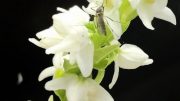
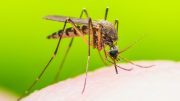
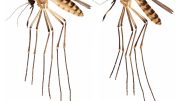
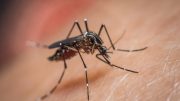
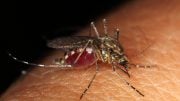
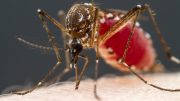
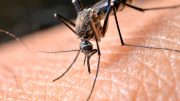
Be the first to comment on "Why Are Mosquitos So Attracted to Me? [Video]"